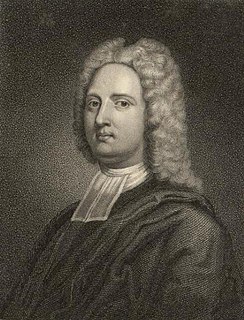This article has multiple issues. Please help improve it or discuss these issues on the talk page . (Learn how and when to remove these template messages)
|
John Guyse (1680-1761) was an English independent minister.
This article has multiple issues. Please help improve it or discuss these issues on the talk page . (Learn how and when to remove these template messages)
|
John Guyse (1680-1761) was an English independent minister.
Guyse was born at Hertford in 1680. He was educated for the ministry at the academy of the Rev. John Payne at Saffron Walden, and began to preach in his twentieth year. He sometimes assisted William Haworth, then minister of a congregation of dissenters in Hertford, and succeeded him in the charge 27 September 1705. His ministry at Hertford was distinguished by the vigour of his attacks on Arianism.
In 1727 he was invited to become first minister of a congregation which had been formed by a secession from Miles Lane, Cannon Street, and had established itself in New Broad Street. Being advised to leave Hertford, as his health was overtaxed, he complied with the request. From about 1728 he preached the Coward lecture on Fridays at Little St. Helen's, and from 1734 the Merchants' lecture on Tuesdays at Pinners' Hall.
Guyse received the degree of D.D. from Aberdeen in 1733 (Gent. Mag. iii. 48). He was an active member of the King's Head Society, which was formed for the purpose of assisting young men to obtain academical training for the ministry. In his old age he became lame and blind, but his blindness was thought to have improved his sermons by compelling him to preach without notes, so that it was said that one of his congregation told him she wished he had become blind twenty years earlier. His only son, William Guyse, was his assistant at New Broad Street from 1728 till his death in 1758. He himself died on 22 November 1761, and was buried in Bunhill Fields burial ground.
Two Coward lectures, which he published in 1729 under the title of 'Christ the Son of God,' were attacked by Samuel Chandler in 'A Letter to the Rev. John Guyse.' Guyse replied with 'The Scripture Notion of preaching Christ further cleared and vindicated in a letter to the Rev. Mr. Samuel Chandler,' 1730. Chandler then wrote 'A Second Letter' to Guyse, which the latter answered in an appendix to a 'Sermon on the Death of John Asty.' A complaint against him seems to have been the fact that he had accused ministers generally of not preaching Christ. The disputants treated each other badly, but were afterwards reconciled.
Besides the works mentioned above he wrote the following:
John Wesley stated in the Preface to his Notes on the New Testament that he was indebted to Dr. Guyse for many 'useful observations'.

Matthew Henry was a Nonconformist minister and author, who was born in Wales but spent much of his life in England. He is best known for the six-volume biblical commentary Exposition of the Old and New Testaments.

Philip Doddridge D.D. was an English Nonconformist minister, educator, and hymnwriter.

Samuel Chandler was a British Nonconformist minister and polemicist pamphleteer. He has been called the 'uncrowned patriarch of Dissent' in the latter part of George II's reign.

Joshua Toulmin of Taunton, England was a noted theologian and a serial Dissenting minister of Presbyterian (1761–1764), Baptist (1765–1803), and then Unitarian (1804–1815) congregations. Toulmin's sympathy for both the American (1775–1783) and French (1787–1799) revolutions led the Englishman to be associated with the United States and gained the prolific historian the reputation of a religious radical.
James Foster was an English Baptist minister.
Hugh Farmer was an English Dissenter and theologian.
Roger Flexman (1708–1795) was an English Presbyterian minister, known also as a chronological and historical scholar, and published as an indexer and bibliographer.
David Jennings (1691–1762) was an English Dissenting minister and tutor, known also as the author of Jewish Antiquities.
Thomas Amory D.D. was a British dissenting tutor and minister and poet from Taunton.

Thomas Bradbury (1677–1759) was an English Dissenting minister.
Samuel Bury (1663–1730) was an English Presbyterian minister.

James Peirce (1674?–1726) was an English dissenting minister, the catalyst for the Salter's Hall controversy.

John Evans D.D. (1680?–1730) was a Welsh divine.
James Duchal, D.D. (1697–1761) was an Irish Presbyterian divine.
Paul Cardale was an English dissenting minister.
Jabez Earle, D.D. (1676?–1768), was an English Presbyterian minister. He had a career of nearly 70 years as a London preacher.
Caleb Fleming, D.D. was an English dissenting minister and Polemicist.
Philip Gibbs (1695-1752) was an English nonconformist minister and stenographer, known now as the first historian of shorthand writing.
Abraham Taylor, was an English Independent minister and dissenting academy tutor, known as a controversialist.
Jeremiah Hunt, D.D. was an independent minister.
![]() This article incorporates text from a publication now in the public domain : "Guyse, John". Dictionary of National Biography . London: Smith, Elder & Co. 1885–1900.
This article incorporates text from a publication now in the public domain : "Guyse, John". Dictionary of National Biography . London: Smith, Elder & Co. 1885–1900.
| Wikiquote has quotations related to John Guyse . |